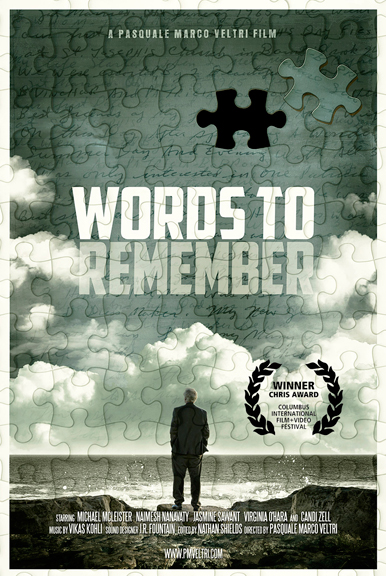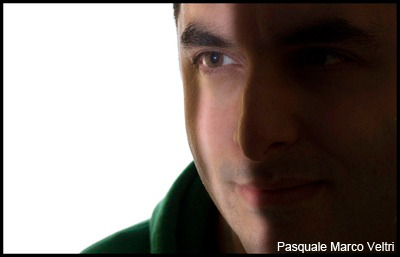Canadian filmmaker Pasquale Marco Veltri wins Chris Award
By Alexandra Heilbron on November 20, 2014 | Leave a Comment
 Pasquale Marco Veltri is a Canadian filmmaker and photographer whose films have screened nationally and internationally in Canada, Britain, France, Italy, and Egypt. His film Measuring Tape Girl has screened at the Cannes Film Festival and the Montreal World Film Festival. Here he talks about his latest film, Words to Remember, which won the Chris Statuette for Best Narrative Film at the Columbus International Film and Video Festival. The Chris Award is the top honor at the festival and also has been a qualifying festival for the Academy Awards. Veltri will receive the award at the 62nd Annual Awards ceremony this Saturday at the Columbus College of Art and Design.
Pasquale Marco Veltri is a Canadian filmmaker and photographer whose films have screened nationally and internationally in Canada, Britain, France, Italy, and Egypt. His film Measuring Tape Girl has screened at the Cannes Film Festival and the Montreal World Film Festival. Here he talks about his latest film, Words to Remember, which won the Chris Statuette for Best Narrative Film at the Columbus International Film and Video Festival. The Chris Award is the top honor at the festival and also has been a qualifying festival for the Academy Awards. Veltri will receive the award at the 62nd Annual Awards ceremony this Saturday at the Columbus College of Art and Design.
How long have you been a filmmaker?
I’ve been making film for about 10 years now, but it’s something I’ve been dreaming of my whole life. I grew up watching Star Wars and E.T., so like most kids I had dreams of traveling to space. One day, I turned over one of my Star Wars trading cards and there was picture of someone with a giant camera on the set of the film. I had no idea that people made movies until that moment. Once I understood that there were people that made movies I never looked back; it was all I thought about.
What languages are in the film?
You can walk down the street of any major city in Canada and by the time you have travelled three blocks you have probably heard three to four different languages. I wanted to represent the backgrounds and cultures I grew up in and the only way to do that was to have several different languages in the film; Hindi, Gujarati, English and French. The mixing of languages helped build the universal themes of family and living in the moment. In the end the use of four languages helped me gain a strong appreciation for the proper representation of diversity in my films.
 Why did you decide to create a film like Words to Remember? What does it mean to you?
Why did you decide to create a film like Words to Remember? What does it mean to you?
I went through a period of time where I was desperately trying to evaluate what I might regret at the end of my life. I was hoping to discover what I regretted now and what could I do to change things before it was too late. After making a few simpler films, I was trying to see if I could push the boundaries of a narrative film and try to tell a story as visual poem. A visual poem could tell a story in a more universal way, but at the same time hug the edges of narrative film.
Where do you live in Canada?
I currently live in Toronto, right beside a movie theater. It’s a dangerous thing for a movie fan like myself. Being able to go to movies without getting wet when it’s raining is a luxury I never dreamed of having. I know I’ll miss that when I get around to moving.
Where was the film shot? How many locations and why?
The film was shot all over the GTA. There were about 20 different locations in Toronto, Oakville, Mississauga, Scarborough and Burlington. The film needed to have a dream-like quality and we tried to find postcard perfect locations that were close enough to get to by car. We were working with a limited budget so we had to do whatever we could to maximize the locations we had available to us.
What is the underlying message in this film?
The film is about regret. What might you regret at the end of your life? How important is your anger and how important are your own opinions in the grand scheme of things? How you treat others is more important than how many times you were proven right. There’s a disconnect between generations and I think we’re losing our ability to emotionally connect with other people. We’re all hardwired to focus on our careers and we forget that life is about caring for the ones we love and it’s important to continually reinforce the emotional bonds we have with one another. The film is about simplifying your core values and caring for the ones you love.
Did you receive any funding for the project?
We did a little bit of crowdfunding for this project but more than 90 per cent of the film is self-funded. I enjoy going bankrupt… which is what happens to me after every film I have made so far.
Is it hard to find funding for this type of project?
It’s very difficult to find funding for any project, especially very personal small films, but I’ve never let that stop me. Fundraising is the most important part of filmmaking and it’s something I’m only at the beginning of understanding. It is a never-ending struggle to get projects off the ground and you have to find a way to keep going – with or without funding.
What are the most compelling scenes in the film?
It might be hard for me to be able to pick but there is a moment in the film where a man working in a cubicle turns his chair around, pushes down his cubicle wall and runs into the forest. The more visual a scene is the more compelling it is to me. You can communicate ideas to an audience with visual metaphors that can speak to your audience without any dialogue. The most powerful films I’ve ever seen always let the images tell the story.
Where will the film be distributed?
Words to Remember will be on the film festival circuit for another six months or so. After that we’ll hopefully be having some type of VOD release and some indie screenings in a few different cities. Our goal is to get Words to Remember to as many people as possible so we can build an audience for our upcoming projects.
What “Words to Remember” would you share with your fans?
One of the lines from the film that stands out for me is: “Anger; it turns out is a sign of weakness, and I’m the weakest person I know.” Hopefully everyone who sees the film can take a few words of wisdom away with them.
There are no comments yet, why not be the first?